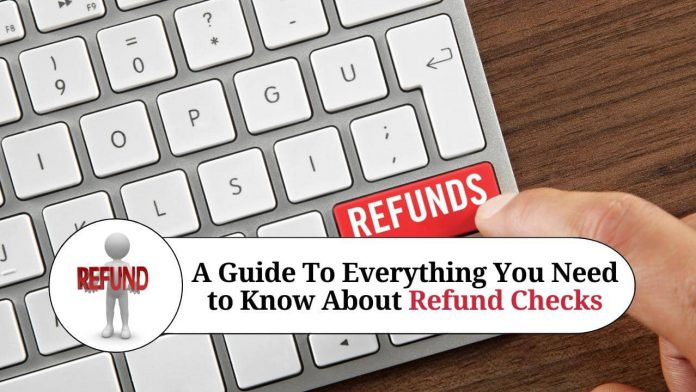Refund Checks: What You Need to Know
Are you expecting a refund check from the government or a company? A refund check is a payment that is issued to repay an individual for overpaid taxes, returned merchandise, or other reasons.
While receiving a refund check can be exciting, it’s important to understand what to do with it and how to handle it properly. In this blog, we’ll go over everything you need to know about refund checks.
Endorse the check
The first step in cashing or depositing a refund check is to endorse it. This means you’ll need to sign the back of the check.
Endorsing a check is a security measure that ensures the check is being deposited into the correct account and that the person depositing the check is authorized to do so. If you’re depositing the check into an account at a bank, you may need to endorse it differently than if you were cashing the check at a check-cashing store.
Deposit or cash the check
Once you’ve endorsed the check, you can deposit it into your bank account or cash it. If you deposit the check, you may need to wait a few days for the funds to become available, depending on the policies of your bank.
If you’re cashing the check, you’ll need to go to a check-cashing store or a bank and present a valid form of identification, such as a driver’s license or passport. The check-cashing store or bank will verify the check and provide you with cash in exchange.
Consider the taxes
It’s important to keep in mind that a refund check may be subject to taxes. Depending on your income, the amount of your refund check may be taxed.
If you’re receiving a refund from the government, the tax authorities will deduct any owed taxes from the refund before issuing a check. If you’re receiving a refund from a company, it’s important to check with a tax professional to determine if the refund is taxable.
Read Other Useful Blogs:
Use caution when spending the funds
It’s important to be careful when spending funds from a refund check, especially if the refund is substantial. Consider using the funds to pay down debt, save for a future expense, or make a wise investment. Avoid using the funds to make impulsive purchases that you may regret later.
In conclusion, a refund check can be a welcome source of extra funds, but it’s important to handle it properly. By endorsing the check, depositing or cashing it, being mindful of taxes, and using caution when spending the funds, you can ensure that your refund check is used to its fullest potential.
Know the expiration date
Refund checks often have an expiration date, which is the date by which the check must be cashed or deposited. If you don’t cash or deposit the check by the expiration date, the check will become invalid, and you’ll need to request a new check.
It’s important to keep track of the expiration date and make sure to cash or deposit the check in a timely manner. Some banks may still accept expired checks, but it’s best to contact the issuing entity to confirm.
Protect your personal information
Be cautious when handling your refund check to avoid fraud and identity theft. Avoid writing personal information, such as your Social Security number or account numbers, on the check. Also, be careful when depositing the check into an ATM, as ATM skimming devices can steal your personal information.
If you’re unsure about the safety of the ATM, consider depositing the check inside the bank, where you have the ability to speak with a teller.
Consider direct deposit
If you’re receiving a refund from the government, consider signing up for a direct deposit. Direct deposit is a safe and secure way to receive your refund, and it eliminates the need to wait for a check to arrive in the mail. Direct deposit also allows you to receive your refund more quickly, as you won’t need to wait for the check to clear.
To sign up for direct deposit, you’ll need to provide the government with your bank account information, including your routing and account numbers.
Conclusion
In conclusion, a refund check can be a useful financial tool, but it’s important to handle it responsibly. By following the tips, you can ensure that your refund check is deposited or cashed safely, and that you receive the full amount due to you.
Frequently Asked Questions (FAQ’s)
Q.1) What is a refund check?
A refund check is a payment issued to repay an individual for overpaid taxes, returned merchandise, or other reasons. The check is issued by a government agency or a company to repay the individual for the overpayment.
Q.2) How do I endorse a refund check?
To endorse a refund check, sign the back of the check. Endorsing the check is a security measure that ensures the check is being deposited into the correct account and that the person depositing the check is authorized to do so.
Q.3) Can I deposit a refund check into my bank account?
Yes, you can deposit a refund check into your bank account. Simply endorse the check and deposit it into your account at a bank. You may need to wait a few days for the funds to become available, depending on the policies of your bank.
Q.4) Is a refund check taxable?
It depends. Depending on your income, the amount of your refund check may be taxed. If you’re receiving a refund from the government, the tax authorities will deduct any owed taxes from the refund before issuing a check. If you’re receiving a refund from a company, it’s important to check with a tax professional to determine if the refund is taxable.
Q.5) What should I do with a refund check?
It’s important to be careful when spending funds from a refund check. Consider using the funds to pay down debt, save for future expenses, or make a wise investment. Avoid using the funds to make impulsive purchases that you may regret later.
Q.6) How long do I have to cash a refund check?
Refund checks often have an expiration date, which is the date by which the check must be cashed or deposited. If you don’t cash or deposit the check by the expiration date, the check will become invalid, and you’ll need to request a new check.
Q.7) Can I sign up for a direct deposit for my refund check?
If you’re receiving a refund from the government, you can sign up for a direct deposit. Direct deposit is a safe and secure way to receive your refund, and it eliminates the need to wait for a check to arrive in the mail. To sign up for a direct deposit, you’ll need to provide the government with your bank account information, including your routing and account numbers.
Q.8) How can I protect my personal information when depositing a refund check?
Be cautious when handling your refund check to avoid fraud and identity theft. Avoid writing personal information, such as your Social Security number or account numbers, on the check. Also, be careful when depositing the check into an ATM, as ATM skimming devices can steal your personal information. If you’re unsure about the safety of the ATM, consider depositing the check inside the bank, where you have the ability to speak with a teller.




















